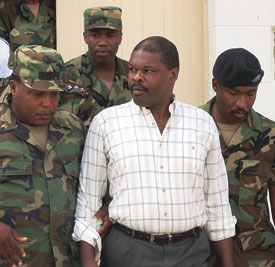SECOND CHANCE

COMPAY WINS APPEAL, GETS NEW TRIAL
A pall of dismay and disbelief hung over the precincts of the Court when on Tuesday this week the Court of Appeal freed Daniel âCompayâ Trimmingham of his murder conviction while ordering a re-trial for the same murder.{{more}}
Compay Trimminghamâs good fortune, which shocked the nation, comes only days after two other murder accused were set free on technicalities when their cases were called in different circumstances.
In the Compay case, which has attracted widespread media and public attention, Lawyer Kay Bacchus-Browne presented grounds of appeal, which found favour with the Court of Appeal.
The core of her submission focused on the âmissingâ analystâs report and the âwithdrawnâ cutlass, the acknowledged murder weapon. That cutlass, according to the chief witness for the prosecution, had blood on it when it was ditched by the accused âCompayâ. The same chief witness took the police to the scene where the cutlass was ditched and from where it was recovered.
According to Bacchus Browne, the cutlass, when analysed, was found to have no blood on it. The report of the analyst and the cutlass were not put in as evidence by the prosecution. Neither was the defence given the opportunity to avail itself of the said report and cutlass.
Trimmingham was fortunate that the Court of Appeal was of the view that the prosecution had an inescapable duty to put in the analystâs report and the cutlass. It was also found that the prosecution ought to have permitted the defence to cross-examine the analyst on the report, as well as the cutlass.
The failure so to do inevitably led to the quashing of âCompayâsâ conviction for murder and the consequential order for a re-trial on the same murder charge at a future Assizes.
Now it is anyoneâs guess whether the prosecution can come up with an airtight enough case the second time around to secure a conviction of the murder accused.
Trimmingham however was not allowed to walk free as persons accused of murder are kept at Her Majestyâs pleasure at the Prisons.
Now the public scrutiny of this case will continue.
In the other cases mentioned, Joshua âCabbageâ Pompey was acquitted of the Christmas Eve murder of Wade Durrant who was shot in broad light amidst the bustle of shoppers in Middle Street.
Justice Frederick Bruce-Lyle found that the prosecutionâs evidence was âinherently weakâ after defence lawyer Nicole Sylvester made a no-case submission on the grounds that there was conflicting evidence by the two police witnesses who testified for the prosecution.
Acting Director of Public Presecutions Colin Williams pleaded in vain that the case should be put before a jury but this was denied by the Judge.
And in the other case which has been commanding public attention, Matthew Haynes who had been charged with the murder of his wife Ella Haynes was set free, again on a technicality. The prosecutionâs case relied on the evidence of the accusedâs eight year old son. The child was not sworn on oath since he did not know the difference between a lie and the truth.
All three cases have been the subject of much debate over this past week.









